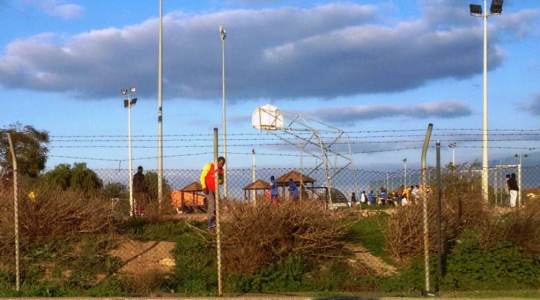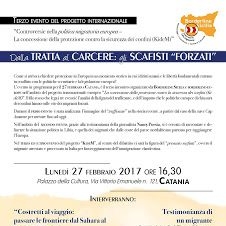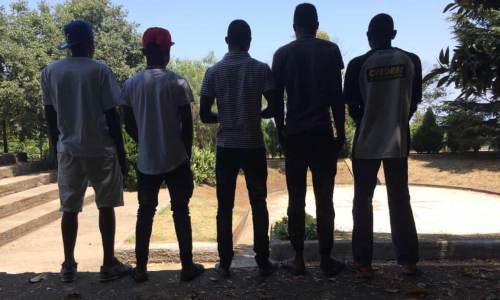The life of 18-year-olds* in eastern Sicily
Most of the complex problems regarding immigration in Italy are rooted in a common and mistaken approach of emergency assistance used as a normal model to manage the phenomenon. Yet in fact we are not facing an exceptional state which requires procedures of emergency, but rather a permanent reality which needs to be addressed for what it really is without appealing to temporary solutions that resolve little over the long run.
The reception system is one of the sectors in which emergency is a constant element. The slowness, with which the application of the national plan for the distribution of asylum seekers and refugees shared by the Ministry of the Interior and ANCI is being implemented, is evident to everyone.
It is also clear that the gradual overcoming of the emergency logic, the coordination between institutions and a common reception model would be a fundamental step towards a more stable system. Furthermore, extraordinary reception is not temporary at all: the average length of stay in the CAS are very long and the guests often find themselves in structures lacking staff and minimum services, which are not guaranteed. There are thus various problems, but when institutions fail to redistribute the reception on national level and to extend the SPRAR system, it is even more complex to avoid the emergency approach.
With regards to the more vulnerable categories, such as unaccompanied minors, the problems of this reception system are even heavier. Despite the modifications of the Zampa law and the Legislative Decree of December 22nd 2018 n. 220, we continue to witness arbitrary practices that are not in line with the regulation. The majority of unaccompanied minors, of which there are many in Sicily, find themselves in reception or emergency facilities for a much longer time than the expected 30 days, due to extremely long waiting times for transferring into facilities of secondary reception, which generates frustration and mistrust towards the integration young people want and search for.
The transition to the age of majority
The situation does not improve even when the minors reach the age of majority: the age group of most unaccompanied minors in Italy is between 16 and 17 years. Thus, they are very close to losing the kind of protection that the Italian legal order intends for minors. With their 18th birthday, they become legal adults by all means, and during the extremely important period of transition, which they need to face as young adults, they are not protected at all, but paradoxically face even more hardships. Like every year, at the beginning of the year 2018 there were high numbers of minors who reached the age of majority. This is due to the fact that many minors only know their year of birth, and at their arrival they are arbitrarily assigned the 1st of January as date and month of birth. In that month we witnessed extremely high numbers of requests for transfers to the SPRAR or for the extension of the reception in the centres of minors, which then blocks the administrative practices of the transfers.
As a consequence of the high number of 18-year-olds present in Sicily and of the scarce number of SPRAR places, on August 4th of last year the ministry passed a circular which established priority for beneficiaries of international protection, followed by beneficiaries of humanitarian protection and lastly followed – if there are any free spots left – by asylum seekers. What happens to those who cannot access the SPRAR? Does an 18th birthday mean that the importance given to the “superior interest of the minor”, valid up until one day before their birthday, suddenly becomes invalid?
Provinces of eastern Sicily
Different practices exist: the various provinces of eastern Sicily differ in their choices and enforcement of the law. In Catania and Caltanissetta, for example, the young people are transferred, once they reach legal age, from the communities for minors to the nearby CARA facilities – Mineo and Pian del Lago – which accommodate a very high number of people, are often denounced due to lack of care and abandonment. Especially the CARA of Mineo is well known for many critical concerns regarding the management of the facility. These places are not suited for adults, let alone for a young person who has just reached the age of majority. In Catania, the transfer of A. – and of many other young adults that have just turned 18 – to the CARA of Mineo from the community, which had taken him in, has pushed various realities of the province to meet on January 27th, to discuss about this issue and to try to find solutions together by setting up the “Territorial Sicilian Forum”. Present were various NGOs, associations, reception centres, people responsible for CPIA, religious communities and civil society groups. Of the institutions on the other hand, only one had followed the invitation, the Tribunal of Minors. The story of A. is particular, because it shows the contrast between two institutions: the Tribunal of Minors which had accepted to extend the reception in the original allocation until the age of 21, and the prefecture, which on the other hand sent the decision about the transfer to the CARA, thus prevailing over the tribunal in terms of economic competences. Within a few days, A. was transferred to the CARA of Mineo and was forced to interrupt the process of integration he had started by attending school, going to a football school and being part of a theatre laboratory. He was also forced to leave the network of emotional relations he had formed in that place: his friends and the people with whom he had been able to form a relationship of trust. He was thus moved away from a place in which he had built his life project. By choice of the city of Catania, people who are more rooted are the ones moved first following the logic of “permanence”. “The kids have become postal packages”, says O. during the Forum which he participated in as a guest together with the community. “We came here to grow up and we are not only here for ourselves but also to contribute to this country. Italy is becoming a market, we are the goods, and the reception centres are the couriers”. Fortunately, there are also important initiatives such as Refugees Welcome which give the possibility to beneficiaries of protection – 18-year-olds and not – to be hosted for some months by Italian volunteer “families”. Unfortunately, for now there are few families willing to take in young people, help them avoid being uprooted and quickly reaching integration and the autonomy sought after.
The case of Caltanissetta is similar to the one of Catania. A social worker reports that compared to other provinces, the number of requests of protection presented by young people in the communities for minors is lower. The majority of minors follows the path, which goes from residence permit for minors to attempts of converting it into permission for studies or work. In certain cases the requests for protection is presented after reaching adult age. The young adults who are beneficiaries of protection are transferred to the SPRAR while the majority of those requesting transfer are put to the CARA of Pian del Lago after they turn 18: the young people are taken from the communities they belong to with a few days of notice or even directly from the school without prior communication. Exemplary is the case of T., an Egyptian boy seeking asylum, who, once he turned 18, was transferred to the CARA of Pian del Lago. A few weeks after his arrival, scared and frustrated, he chose to leave because he was not able to see a future for himself. Now he is living on the streets of Caltanissetta, without a home, hoping to get documents, and an easy target of exploitation.
What Siracusa and Enna have in common, on the other hand, is the widespread practice of transferring 18-year-olds to the CAS, because they are provinces, which do not have CARA. In Siracusa, if the many requests sent by centres of first and second reception for minors at the Central Service with the goal of SPRAR transfers cannot be met due to lack of spaces, there remain two alternatives: the beneficiaries of international and humanitarian protection are included in the SPRAR wherever possible, including places outside of the province, thereby interrupting the projects of the young people. The asylum seekers on the other hand are sent to the various CAS (Rosolini, Città Giardino etc.). The young people with study permit are left with two options: requesting an extension until the age of 21, or the street.
In Enna, the transfers into the SPRAR are also not so immediate. Despite the many notifications from the centres for minors, the majority of 18-year-olds is transferred to the CAS. Only the lucky ones are able to be included into the SPRAR project. Unfortunately, not only are the places in a SPRAR limited, but there is also a lack of coordination in the central service meaning that many spots in projects remain unused. Due to this lack of communication, many centres for minors follow the practices of autonomously attempting to find free spots in the SPRAR and only after communicating it to the Central Service.
In the province of Messina the 18-year-olds beneficiaries of international or humanitarian protection are transferred to the SPRAR, while the asylum seekers or the applicants, depending on the individual case and on luck, end up in the SPRAR or in the CAS. There, they are forced to take a step back regarding their professional training and integration. In the majority of cases they arrive from first reception centres for minors, where they spent much longer time than the 30 days set out by the Zampa law. Regarding minors with residence permit due to their age, which have already converted their residence permit into a study or work permit, usually an extension of their stay in the centres of first or second reception is requested. This request comes from the difficulty of accessing other centres and from the tangible possibility that the young people might end up on the streets. This puts additional responsibility on the centres and entails the loss of many privileges that the 18-year-olds had in the same centres when they were minors. For example, when the city council does not economically support the extension of the person’s reception, they will be the only ones not receiving pocket money anymore. A daily allowance which the Ministry of Internal affairs gives to minor migrants is stopped the moment they turn 18. In Messina there is a round table that comes together every month and that includes social workers, tutors, people in charge of the facilities and the councillor, in order to try and manage the welcome of foreign minors and 18-year-olds.
In the province of Ragusa, first of all beneficiaries of protection and second the asylum seekers or applicants are transferred to the SPRAR if places are available. If someone has only presented the manifestation of the intention, they are certainly destined to a CAS. We were signalled some cases that show further problems connected to the already complex situations of young adults: during the period of time (sometimes months) in which the young people are on the street waiting for allocations or transfers to welcome structures, the only alternative to the street are allocations such as those offered by the Caritas, with temporary accommodation and meals. The same Caritas has reported some cases of 18-year-olds that have been banished from the Community the moment in which, now as adults, they withdraw the notification of the decision of the competent territorial commission. Only following the report of the Caritas they were able to be inserted into the SPRAR of the province. This protection unfortunately cannot be guaranteed for everyone but just for those who manage, by luck or perseverance, to enter the circles which try to compensate for the mistakes of the welcome system.
A general pictures emerges which shows that during a period so important as the passage to the legal age, young people are completely abandoned. Even those who fortunately were able to start a path of education, study and integration suddenly find themselves having to come to terms with a frustrating reality that might cancel everything they had been working towards. When transferred to other provinces or to the countryside far away from inhabited centres, to CAS or CARA and only in some cases to SPRAR, they have to stop all activities or emotional relationship. Trying to follow a school programme can be difficult as well, given that often they have to wait for months before being transferred to a new CPIA. Integration projects, which are often invested in a lot, are abruptly interrupted due to a lack of comprehensive vision. These practices, in addition to causing apathy and mistrust, push many young people to abandon the welcome system – even when they do not have a residence permit yet – and they thereby end up in the hands of criminals, in human trafficking, as slaves in the countryside, or homeless. When we went to the CARA of Mineo, one of the 18-year-olds was transferred less than two weeks before from a centre for minors in Catania, told us how he felt afterwards: “My dream was to take the eight grade exam…but now they took everything from us. Here, at the Cara in Mineo we are in Africa…in Italy I only lost time”.
Sara Scudero
Viola Gastaldi
Borderline Sicilia
*We refer here to “18-year-olds” as young adults who have just turned 18.
*CARA – Centro di accoglienza per richiedenti asilo: reception centre for asylum seekers
*CAS: Centri di Accoglienza Straordinaria, Extraordinary Reception Centres
*SPRAR – Sistema di protezione per rifugiati e richiedenti asilo: protection facilities for asylum seekers and refugees
Translated by Greta Pallaver




